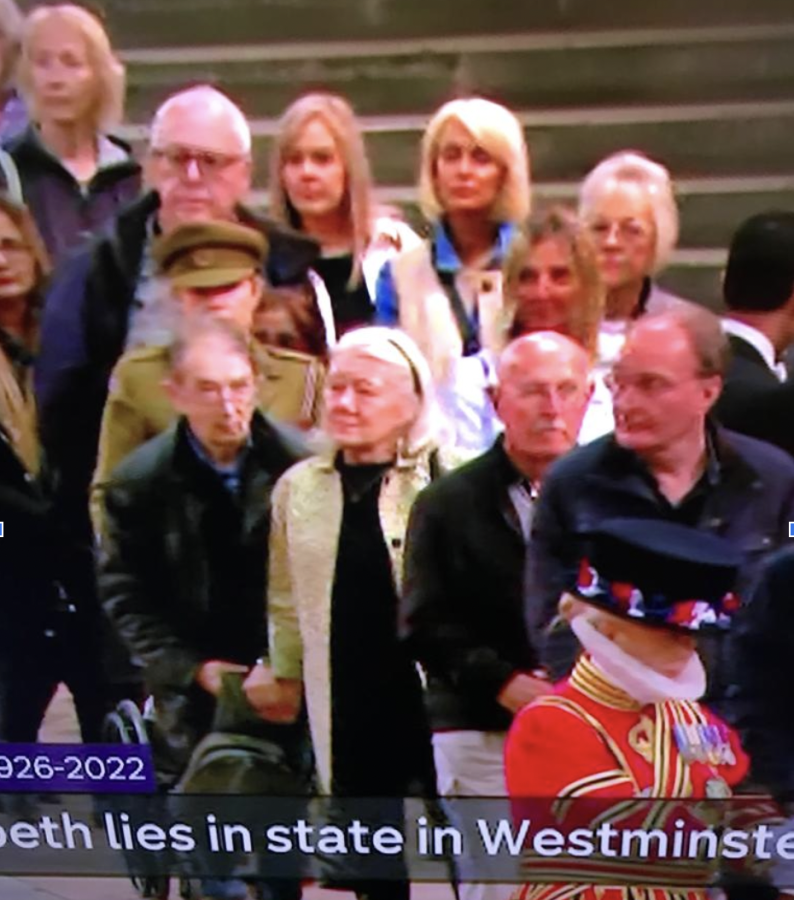A Moment Captured — An OHS Teacher Experiences the Aftermath of Queen Elizabeth II’s Death
Mrs. Stanford, caught on Channel 4 News viewing the Queen lying in state.
September the 8th marked a time of unprecedented change for the United Kingdom, and for many worldwide. The death of Queen Elizabeth II has sparked strong sentiments globally, with many startled to find themselves within the narrative of such a significant event. One person with a unique experience is our own English instructor here at OHS, Mrs. Stanford, who was present in the United Kingdom at the time and has kindly shared her experience with me.
Having spent her childhood years in England, Mrs. Stanford felt the Queen’s profound influence from an early age. She took the time to provide some wonderful anecdotes that give a sense of just how “personal” that influence was. Her grandfather, having lived with her family when she was young, had positioned a broad, distinctively captured portrait of Queen Elizabeth II in the kitchen, and she recalls that each morning, in front of his observant grandchildren, he would salute the Queen to show his respects. He would further instill table manners and good etiquette by informing them the Queen was expectantly watching over as they ate.
Advancing a few years, Mrs. Stanford recounts: “When I was nine, [the Queen] was coming to tour where I lived… We were in the road, and I was lifted right next to the glass, and she [slightly waved].” This is just one of the moments in her life that she felt the influence of the royal family. The Queen had in fact been a constant throughout Mrs. Stanford, and many others’ lifetimes: “Because I’ve been alive as long as she’s been reigning… it’s [like] losing a family member.” According to her, the stability the Queen had continually provided made the loss difficult to comprehend, contributing to the sense of grief introduced after the announcement of her death.
During Mrs. Stanford’s recent trip to London, which coincided with the Queen’s passing, she was able to witness the unfolding events first-hand: “On the day that they announced [her illness], it was a Thursday, [and] you could tell, everybody knew, that when they make an announcement like that… it was really serious,” notes Mrs. Stanford. Once the actual death was finally publicized, “Everything was quiet. Nobody was on the streets… there was no traffic. [There was] this quietness that descended on the country. You could almost touch it — it was palpable.”
Eager to pay their respects, Mrs. Stanford and her husband promptly headed to Buckingham Palace. It was here amongst the dismayed crowds that they witnessed the arrival of a royal vehicle. She relates, “We’d been [sitting near] the palace (on Friday), and then a car came through — and it was [King] Charles. We saw him get out of the car, him and Camilla… and you could see he was really upset. His mom had just died.” Her narrative continues, recollecting the moment that two opera singers began to sing an emotional rendition of ‘God Save the King’ with the crowd joining in a sentimental manner.
She recounts that in the UK, the weekend passed with people glued to their television screens, channels relating headline after headline addressing the events. On Tuesday, Mrs. Stanford joined the crowds lining the roads as the Queen’s coffin was brought down from Scotland. The moment, broadcasted globally, solidified the occurrences for attendance and viewers alike.
After such a brief but poignant moment, two final events add vivid color to Mrs. Stanford’s retelling of her experiences.
The first, a trip to Westminster to view Queen Elizabeth II at rest. People had traveled from far and wide for the opportunity, some waiting in line for no less than 13 hours to pay their respects. Ms. Stanford tells me, “[although] it was packed — just jam-packed — there were about four people ahead in the accessible queue… We walked into [the hall], which was impressive in itself… and like watching a tableau… or an art installation: [everything] was completely silent… We [stood] right in front of the coffin…” I could tell by the tone of her voice that words weren’t enough to convey the magnitude of her experience.
She noted that at this moment, “A friend suddenly called and said ‘just to let you know, you’ve been on the evening news tonight.’ We were caught on camera — Channel 4! That was completely surreal.”
Mrs. Stanford took a moment to reflect on the past days as she witnessed the final procession of the Queen’s coffin. She emphasized to me how from her perspective the Queen was one of the most admirable public servants she has ever known. For Ms. Stanford, the experiences during her trip allowed her to process emotions and sentiments that had been maintained since her childhood; being present in England to pay her respects to the Queen provided a sad but resolute conclusion: “That was it, our final farewell… it was solemn, but you understood.”

